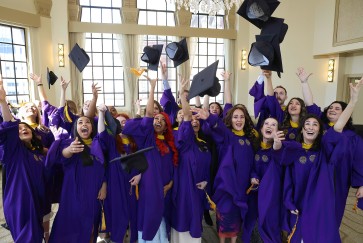New Northwestern students gathered at Wilson Field in Ryan Fieldhouse on Sept. 19 for an official welcome from University leaders, including President Michael Schill.
The annual tradition serves as the capstone of Wildcat Welcome — Northwestern’s week-long period of greeting and orientation for new and transfer students — and constitutes the official jumping-off point of students’ college careers: Classes began Sept. 20.
President Schill, whose tenure began Sept. 12, noted that this year is unique in that he himself is also new to campus. Schill said he is especially excited to be starting the academic year together: “Like you, I’m a newbie.”
Schill went on to emphasize what a “consequential and memorable” experience college can be and encouraged students to make the most of it by pushing beyond their comfort zones.
“Being an educated person in this world today requires an understanding of the full breadth of human experience,” he said.
Recalling his own experiences as a first-generation college student, he said that the first few weeks can be a big transition, but that college ultimately is one of life’s most rewarding experiences.
“Much of what I am today is formed by my education,” he noted.
This year’s new class — more than 2,050 new and transfer students — is a diverse group, hailing from every corner of Chicago, the U.S. and the globe. New students come from 40 Chicago neighborhoods, all 50 states and 60 countries, speaking 60 languages and holding 89 different citizenships, according to Christopher Watson, associate vice president of student outreach and dean of undergraduate enrollment.
In terms of percentages, 6% of the new class graduated from a Chicago Public School; 10% are international students; 15% are the first in their family to attend college and 21% received Pell Grant awards.
Schill added that Northwestern has focused on broadening access, and that the numbers of Chicago Public Schools, international and underrepresented students have all doubled over the past decade.
Those first-year students who grew up closest to the North Pole in Alaska and Sweden, Watson joked, would be “fazed the least” by winters in Evanston. Meanwhile, dozens of students raised their hands when he asked who had never seen a snowstorm before.
Watson and other speakers, including professor Ava Thompson Greenwell; Jason Hegelmeyer, president of Associated Student Government; and Mona Dugo, assistant vice president of wellness and dean of students, congratulated the incoming class of first-year and transfer students for earning a place at Northwestern.


